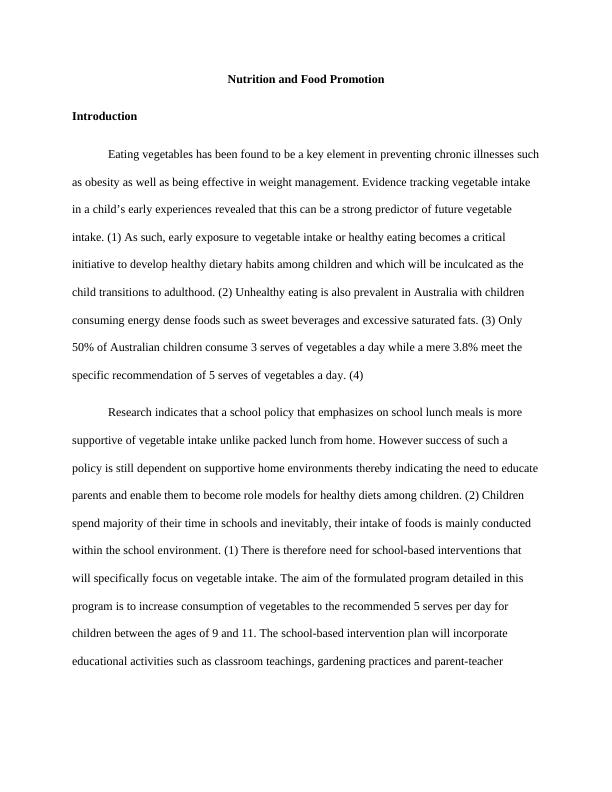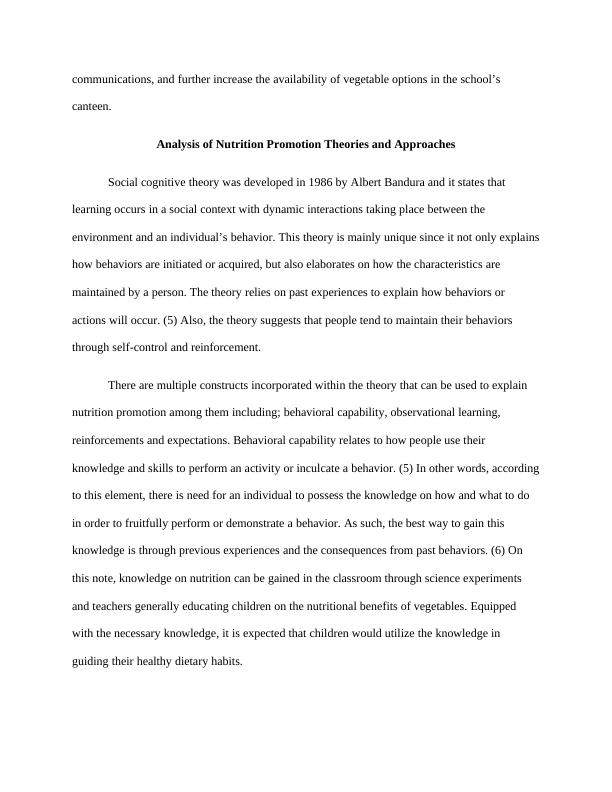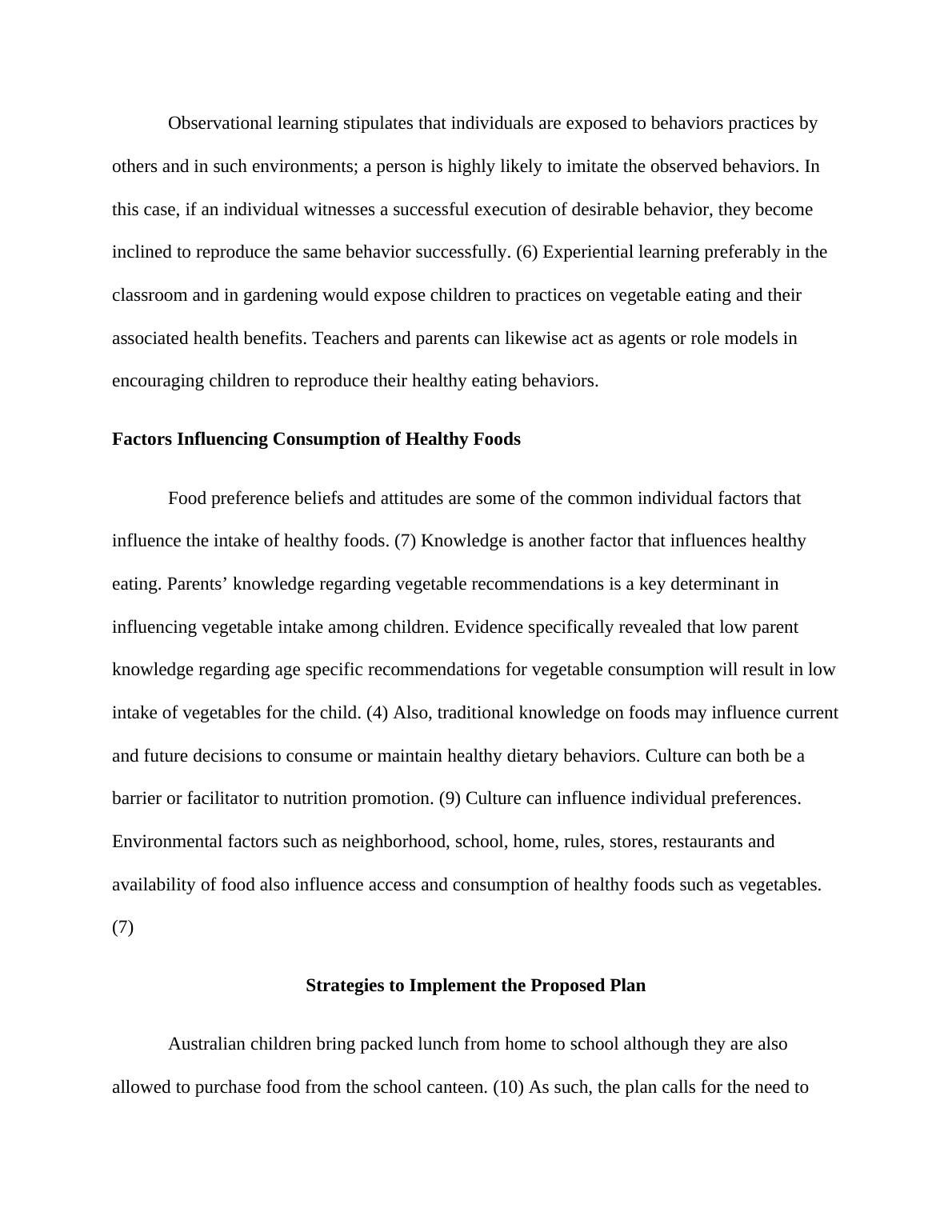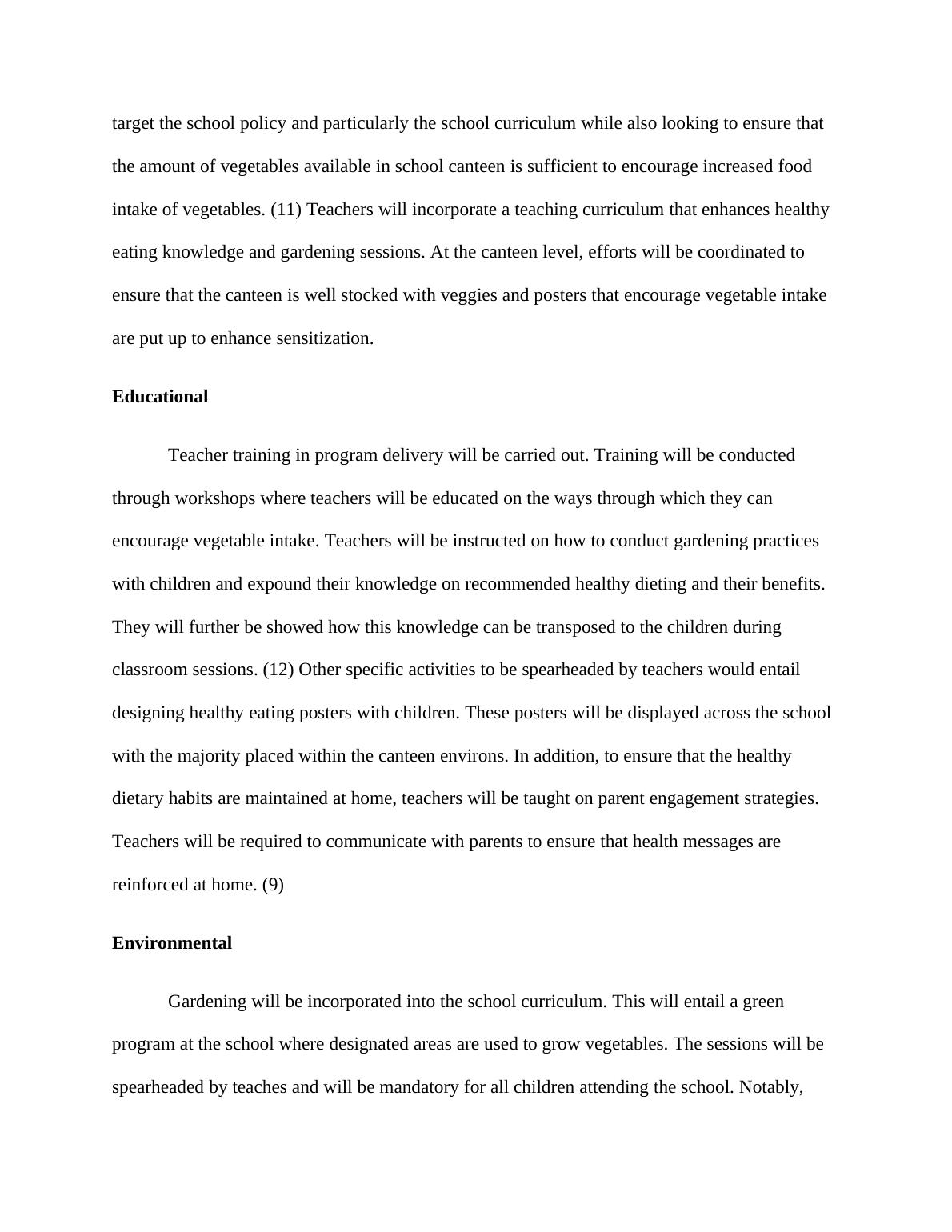Nutrition and Food Promotion
Added on 2022-10-01
11 Pages2921 Words99 Views
Nutrition and Food Promotion
Introduction
Eating vegetables has been found to be a key element in preventing chronic illnesses such
as obesity as well as being effective in weight management. Evidence tracking vegetable intake
in a child’s early experiences revealed that this can be a strong predictor of future vegetable
intake. (1) As such, early exposure to vegetable intake or healthy eating becomes a critical
initiative to develop healthy dietary habits among children and which will be inculcated as the
child transitions to adulthood. (2) Unhealthy eating is also prevalent in Australia with children
consuming energy dense foods such as sweet beverages and excessive saturated fats. (3) Only
50% of Australian children consume 3 serves of vegetables a day while a mere 3.8% meet the
specific recommendation of 5 serves of vegetables a day. (4)
Research indicates that a school policy that emphasizes on school lunch meals is more
supportive of vegetable intake unlike packed lunch from home. However success of such a
policy is still dependent on supportive home environments thereby indicating the need to educate
parents and enable them to become role models for healthy diets among children. (2) Children
spend majority of their time in schools and inevitably, their intake of foods is mainly conducted
within the school environment. (1) There is therefore need for school-based interventions that
will specifically focus on vegetable intake. The aim of the formulated program detailed in this
program is to increase consumption of vegetables to the recommended 5 serves per day for
children between the ages of 9 and 11. The school-based intervention plan will incorporate
educational activities such as classroom teachings, gardening practices and parent-teacher
Introduction
Eating vegetables has been found to be a key element in preventing chronic illnesses such
as obesity as well as being effective in weight management. Evidence tracking vegetable intake
in a child’s early experiences revealed that this can be a strong predictor of future vegetable
intake. (1) As such, early exposure to vegetable intake or healthy eating becomes a critical
initiative to develop healthy dietary habits among children and which will be inculcated as the
child transitions to adulthood. (2) Unhealthy eating is also prevalent in Australia with children
consuming energy dense foods such as sweet beverages and excessive saturated fats. (3) Only
50% of Australian children consume 3 serves of vegetables a day while a mere 3.8% meet the
specific recommendation of 5 serves of vegetables a day. (4)
Research indicates that a school policy that emphasizes on school lunch meals is more
supportive of vegetable intake unlike packed lunch from home. However success of such a
policy is still dependent on supportive home environments thereby indicating the need to educate
parents and enable them to become role models for healthy diets among children. (2) Children
spend majority of their time in schools and inevitably, their intake of foods is mainly conducted
within the school environment. (1) There is therefore need for school-based interventions that
will specifically focus on vegetable intake. The aim of the formulated program detailed in this
program is to increase consumption of vegetables to the recommended 5 serves per day for
children between the ages of 9 and 11. The school-based intervention plan will incorporate
educational activities such as classroom teachings, gardening practices and parent-teacher

communications, and further increase the availability of vegetable options in the school’s
canteen.
Analysis of Nutrition Promotion Theories and Approaches
Social cognitive theory was developed in 1986 by Albert Bandura and it states that
learning occurs in a social context with dynamic interactions taking place between the
environment and an individual’s behavior. This theory is mainly unique since it not only explains
how behaviors are initiated or acquired, but also elaborates on how the characteristics are
maintained by a person. The theory relies on past experiences to explain how behaviors or
actions will occur. (5) Also, the theory suggests that people tend to maintain their behaviors
through self-control and reinforcement.
There are multiple constructs incorporated within the theory that can be used to explain
nutrition promotion among them including; behavioral capability, observational learning,
reinforcements and expectations. Behavioral capability relates to how people use their
knowledge and skills to perform an activity or inculcate a behavior. (5) In other words, according
to this element, there is need for an individual to possess the knowledge on how and what to do
in order to fruitfully perform or demonstrate a behavior. As such, the best way to gain this
knowledge is through previous experiences and the consequences from past behaviors. (6) On
this note, knowledge on nutrition can be gained in the classroom through science experiments
and teachers generally educating children on the nutritional benefits of vegetables. Equipped
with the necessary knowledge, it is expected that children would utilize the knowledge in
guiding their healthy dietary habits.
canteen.
Analysis of Nutrition Promotion Theories and Approaches
Social cognitive theory was developed in 1986 by Albert Bandura and it states that
learning occurs in a social context with dynamic interactions taking place between the
environment and an individual’s behavior. This theory is mainly unique since it not only explains
how behaviors are initiated or acquired, but also elaborates on how the characteristics are
maintained by a person. The theory relies on past experiences to explain how behaviors or
actions will occur. (5) Also, the theory suggests that people tend to maintain their behaviors
through self-control and reinforcement.
There are multiple constructs incorporated within the theory that can be used to explain
nutrition promotion among them including; behavioral capability, observational learning,
reinforcements and expectations. Behavioral capability relates to how people use their
knowledge and skills to perform an activity or inculcate a behavior. (5) In other words, according
to this element, there is need for an individual to possess the knowledge on how and what to do
in order to fruitfully perform or demonstrate a behavior. As such, the best way to gain this
knowledge is through previous experiences and the consequences from past behaviors. (6) On
this note, knowledge on nutrition can be gained in the classroom through science experiments
and teachers generally educating children on the nutritional benefits of vegetables. Equipped
with the necessary knowledge, it is expected that children would utilize the knowledge in
guiding their healthy dietary habits.

Observational learning stipulates that individuals are exposed to behaviors practices by
others and in such environments; a person is highly likely to imitate the observed behaviors. In
this case, if an individual witnesses a successful execution of desirable behavior, they become
inclined to reproduce the same behavior successfully. (6) Experiential learning preferably in the
classroom and in gardening would expose children to practices on vegetable eating and their
associated health benefits. Teachers and parents can likewise act as agents or role models in
encouraging children to reproduce their healthy eating behaviors.
Factors Influencing Consumption of Healthy Foods
Food preference beliefs and attitudes are some of the common individual factors that
influence the intake of healthy foods. (7) Knowledge is another factor that influences healthy
eating. Parents’ knowledge regarding vegetable recommendations is a key determinant in
influencing vegetable intake among children. Evidence specifically revealed that low parent
knowledge regarding age specific recommendations for vegetable consumption will result in low
intake of vegetables for the child. (4) Also, traditional knowledge on foods may influence current
and future decisions to consume or maintain healthy dietary behaviors. Culture can both be a
barrier or facilitator to nutrition promotion. (9) Culture can influence individual preferences.
Environmental factors such as neighborhood, school, home, rules, stores, restaurants and
availability of food also influence access and consumption of healthy foods such as vegetables.
(7)
Strategies to Implement the Proposed Plan
Australian children bring packed lunch from home to school although they are also
allowed to purchase food from the school canteen. (10) As such, the plan calls for the need to
others and in such environments; a person is highly likely to imitate the observed behaviors. In
this case, if an individual witnesses a successful execution of desirable behavior, they become
inclined to reproduce the same behavior successfully. (6) Experiential learning preferably in the
classroom and in gardening would expose children to practices on vegetable eating and their
associated health benefits. Teachers and parents can likewise act as agents or role models in
encouraging children to reproduce their healthy eating behaviors.
Factors Influencing Consumption of Healthy Foods
Food preference beliefs and attitudes are some of the common individual factors that
influence the intake of healthy foods. (7) Knowledge is another factor that influences healthy
eating. Parents’ knowledge regarding vegetable recommendations is a key determinant in
influencing vegetable intake among children. Evidence specifically revealed that low parent
knowledge regarding age specific recommendations for vegetable consumption will result in low
intake of vegetables for the child. (4) Also, traditional knowledge on foods may influence current
and future decisions to consume or maintain healthy dietary behaviors. Culture can both be a
barrier or facilitator to nutrition promotion. (9) Culture can influence individual preferences.
Environmental factors such as neighborhood, school, home, rules, stores, restaurants and
availability of food also influence access and consumption of healthy foods such as vegetables.
(7)
Strategies to Implement the Proposed Plan
Australian children bring packed lunch from home to school although they are also
allowed to purchase food from the school canteen. (10) As such, the plan calls for the need to

target the school policy and particularly the school curriculum while also looking to ensure that
the amount of vegetables available in school canteen is sufficient to encourage increased food
intake of vegetables. (11) Teachers will incorporate a teaching curriculum that enhances healthy
eating knowledge and gardening sessions. At the canteen level, efforts will be coordinated to
ensure that the canteen is well stocked with veggies and posters that encourage vegetable intake
are put up to enhance sensitization.
Educational
Teacher training in program delivery will be carried out. Training will be conducted
through workshops where teachers will be educated on the ways through which they can
encourage vegetable intake. Teachers will be instructed on how to conduct gardening practices
with children and expound their knowledge on recommended healthy dieting and their benefits.
They will further be showed how this knowledge can be transposed to the children during
classroom sessions. (12) Other specific activities to be spearheaded by teachers would entail
designing healthy eating posters with children. These posters will be displayed across the school
with the majority placed within the canteen environs. In addition, to ensure that the healthy
dietary habits are maintained at home, teachers will be taught on parent engagement strategies.
Teachers will be required to communicate with parents to ensure that health messages are
reinforced at home. (9)
Environmental
Gardening will be incorporated into the school curriculum. This will entail a green
program at the school where designated areas are used to grow vegetables. The sessions will be
spearheaded by teaches and will be mandatory for all children attending the school. Notably,
the amount of vegetables available in school canteen is sufficient to encourage increased food
intake of vegetables. (11) Teachers will incorporate a teaching curriculum that enhances healthy
eating knowledge and gardening sessions. At the canteen level, efforts will be coordinated to
ensure that the canteen is well stocked with veggies and posters that encourage vegetable intake
are put up to enhance sensitization.
Educational
Teacher training in program delivery will be carried out. Training will be conducted
through workshops where teachers will be educated on the ways through which they can
encourage vegetable intake. Teachers will be instructed on how to conduct gardening practices
with children and expound their knowledge on recommended healthy dieting and their benefits.
They will further be showed how this knowledge can be transposed to the children during
classroom sessions. (12) Other specific activities to be spearheaded by teachers would entail
designing healthy eating posters with children. These posters will be displayed across the school
with the majority placed within the canteen environs. In addition, to ensure that the healthy
dietary habits are maintained at home, teachers will be taught on parent engagement strategies.
Teachers will be required to communicate with parents to ensure that health messages are
reinforced at home. (9)
Environmental
Gardening will be incorporated into the school curriculum. This will entail a green
program at the school where designated areas are used to grow vegetables. The sessions will be
spearheaded by teaches and will be mandatory for all children attending the school. Notably,

End of preview
Want to access all the pages? Upload your documents or become a member.
Related Documents
Promoting Nutrition in Schools: Evidence-Based Strategies and Program Planlg...
|12
|3016
|256
Nutrition and Food Promotion Letter 2022lg...
|8
|1297
|26
Reflective Journal Healthcare Concept 2022lg...
|10
|3321
|17
Evidence-based Practice Change Project Proposal 2022lg...
|7
|1907
|22
NR505 Research Summary Templatelg...
|17
|3703
|12
Health Promotion: Evaluating a School Intervention for Obesity Managementlg...
|7
|1557
|95
